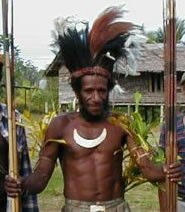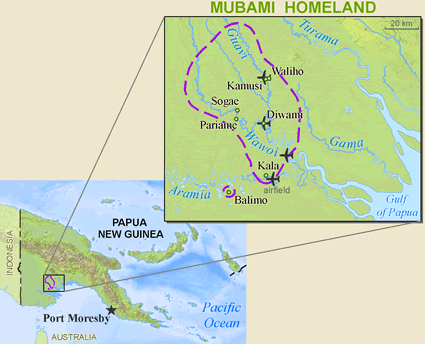The Mubami live on the banks of the Aramia, Guavi, and Wawoi Rivers in southwestern Papua New Guinea. International timber companies have contracted to log the forests on Mubami land. The logging industry has brought change to the area. Healthcare and education are more readily available, but prostitution is on the rise. Landowners receive royalties, enabling them to pay school fees for their children and purchase manufactured goods. However, having cash in hand can open the door to new temptations.
Although the influence of the logging companies has brought change, outside the logging camps the Mubami maintain much of their traditional lifestyle. They continue to harvest sago palm to remove the starch, which is their traditional staple food. They also fish, hunt and plant vegetable gardens. Some still build their houses on stilts from local forest materials, such as split black palm for the walls and floor and shingles made of sago fronds for the roofs. Others use roofing iron and other purchased materials.
The name Mubami and the alternate name Dausuame originate from their traditional jewelry. Some used to wear a bamboo stick, called a mabari'i, through their nose, while others twined bark strings in their hair and coated them with clay to make dreadlocks, called da'uso. These words were combined with the word for 'men' or 'people', ami/ame, and they came to be called Mubami/Dausuame. The Gospel was brought to the Mubami people by their neighbours, the Gogodala, who became a great missionary force in the mid 1900s. The Mubami and many other groups in the region use the Gogodala New Testament and sing worship songs in Gogodala. However, with the exception of the residents in Kala, few Mubami know Gogodala, and understand the Scripture or songs. They have asked for assistance in translating the Bible into their language, but are still waiting. Recently, several Mubami have begun to write worship songs in their own language.
Scripture Prayers for the Tao-Suamato, Mahigi in Papua New Guinea.
| Profile Source: Anonymous |











